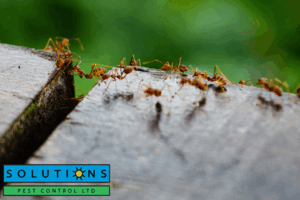Ants are remarkable creatures, known for their teamwork, organization, and complex social structures. One of the most important responsibilities in an ant colony is the protection of their eggs. These tiny, yet incredibly vital, components are the foundation of the colony’s future. But how do ants ensure that their eggs remain safe and thrive to produce new generations? In this article, we’ll dive into the fascinating methods ants use to protect their eggs, from physical barriers to intricate defense strategies. If you’re struggling with an ant infestation, understanding their behavior might give you insight into how to deal with them effectively.
The Importance of Ant Eggs
Ant eggs are the lifeblood of any colony. Each egg has the potential to hatch into a worker, a queen, or even a male ant, depending on the colony’s needs. These eggs are incredibly delicate and must be cared for and guarded until they hatch. Without a steady supply of eggs being laid, an ant colony will eventually cease to exist.
The process of protecting ant eggs begins right after the queen lays them. Worker ants, also called nurses or caretakers, take over the job of protecting the eggs, ensuring they are nurtured and shielded from predators and environmental hazards.
How Do Ants Protect Their Eggs?
1. Physical Protection Through Nest Design
One of the first ways ants protect their eggs is through their nest design. Ant colonies are highly organized, and the nest structure is carefully constructed to shield eggs from external threats.
- Underground Nests: Many ant species build their nests underground, where they can keep the eggs safe from the elements. These nests are often deep and intricate, with multiple chambers and tunnels that provide a secure environment.
- Specialized Chambers: Inside the nest, ants often have specialized chambers or nurseries, where eggs are placed and protected by worker ants. These chambers are usually sealed off to keep the eggs hidden and secure.
In certain species, worker ants will even carry eggs into newly dug chambers to prevent any potential damage from disturbances or predators. This is a key part of their survival strategy, as a vulnerable egg can mean the loss of future generations.
2. Guarding the Eggs: Worker Ants on Patrol
Once the eggs are laid, worker ants take on the task of guarding them. These ants are highly protective and will go to great lengths to ensure the safety of the eggs. Worker ants, typically the first to mature in the colony, will patrol the egg chambers regularly. If they sense any disturbance, they will quickly respond by either attacking the intruder or moving the eggs to a safer location.
- Chemical Defense: Many species of ants use chemicals as part of their defense strategy. Worker ants can release alarm pheromones to signal a threat to the colony. These chemicals act as a warning to other workers, who will quickly rush to the scene to defend the eggs.
- Ants That Fight: If the threat persists, some worker ants may engage in direct combat with intruders. Ants can sting, bite, or use their mandibles to fight off predators or other colony invaders.
3. Feeding and Caring for Ant Eggs
Worker ants are not just defenders; they are also caretakers. These workers feed and groom the eggs regularly to ensure they are healthy and ready to hatch. Ants will carry the eggs to a warmer or cooler part of the nest, depending on the species’ needs and the temperature inside the nest. They move the eggs around as necessary to maintain optimal conditions for hatching.
In some species, ants will use a technique called “trophallaxis,” where they transfer food directly to the eggs by regurgitating it. This ensures that the eggs receive essential nutrients.
4. Ants Protect Their Queen and Her Eggs
The queen ant, the colony’s primary egg layer, is highly protected. She is usually kept in a central, heavily guarded part of the nest, and worker ants will defend her with fierce loyalty. The queen’s eggs are often treated with special care, and workers may surround her and the eggs to ensure no harm comes to them.
Ants will also protect the queen from other members of the colony. If there is an attempt to replace the queen or if there are intruders, the workers will fight back to defend the reproductive member of the colony.
5. Collective Defense and Teamwork
One of the most impressive aspects of how ants protect their eggs is the level of teamwork involved. Ants are highly social insects that work together as a cohesive unit. When there is a threat to the colony, they will swarm to the defense of the eggs and queen. Their coordinated efforts often overwhelm potential predators or invaders, ensuring the safety of the entire colony.
Whether defending the nest from invading ants, other insect predators, or even larger animals, ants can work together to accomplish the task. This collective effort is one of the defining characteristics of an ant colony’s success.
How to Spot Ant Eggs
Identifying ant eggs can help you understand the stage of the infestation in your home. Ant eggs are often white or off-white and are usually oval in shape. They can be quite small, typically less than 1mm in size, so they may be hard to spot without close inspection.
- What Do Ant Eggs Look Like? Ant eggs resemble small, smooth grains of rice or tiny beads, often arranged in clusters within the nest. As the eggs hatch, they develop into larvae and pupae, which are more noticeable than the eggs themselves.
If you are dealing with an infestation, finding ant eggs can be an indication that the colony is thriving, and you may need professional ant control near me to get rid of the problem.

How to Prevent Ant Infestations
While ants have impressive defense strategies, you don’t have to let them overtake your home. Here are some steps to prevent an ant infestation:
- Seal Entry Points: Ants can enter your home through the tiniest cracks and gaps. Sealing off these points can prevent ants from gaining access to your living space.
- Keep Your Home Clean: Ants are often attracted to food and sugary substances. Make sure to clean up crumbs, spills, and food debris regularly.
- Remove Ant Trails: If you spot ants inside, follow the trail back to their nest and eliminate it. This can involve wiping surfaces with soapy water or using ant baits.
If you have a persistent ant problem, it’s essential to contact a North Vancouver pest control professional for advice and treatment.
About Solutions Pest Control
At Solutions Pest Control, we specialize in providing effective and eco-friendly solutions for controlling pests, including ants. Our team of experts can help you address ant infestations and offer advice on preventing future invasions. Whether you’re dealing with ant eggs in your home or need pest control North Vancouver, we have the tools and experience to help you regain control.


